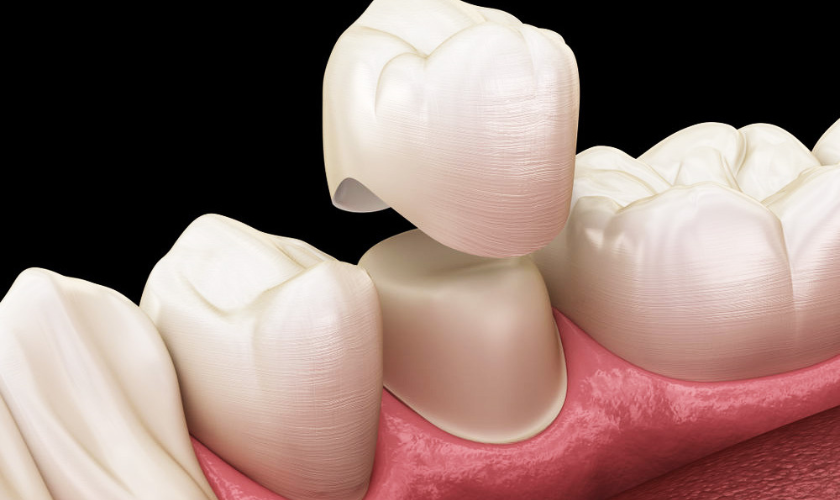Do You Need a Dental Crown? Signs You Shouldn’t Ignore
Addison, TX

Do You Need a Dental Crown? Signs You Shouldn’t Ignore
Your smile is one of your most valuable assets, and maintaining its health is paramount. However, dental issues can arise, requiring intervention to preserve your teeth and oral well-being. One common solution is a dental crown, a versatile restoration that can address a variety of dental concerns. Let’s explore the signs that indicate you may need a dental crown and why you shouldn’t ignore them.
Understanding Dental Crowns: A Versatile Solution
Dental crowns, also known as caps, are prosthetic devices designed to cover and protect damaged or weakened teeth. Made from durable materials such as porcelain, ceramic, or metal alloys, crowns restore the strength, functionality, and appearance of teeth affected by decay, fractures, or other issues.
Dental crowns serve multiple purposes, including strengthening weakened teeth, restoring damaged or decayed teeth, supporting dental bridges, and covering dental implants. With their customizable design and natural-looking aesthetics, crowns blend seamlessly with your natural teeth, providing long-lasting results and enhancing your smile.
Persistent Tooth Pain: A Sign of Underlying Issues
Persistent tooth pain is a red flag that should not be ignored, as it often indicates underlying dental problems that may require intervention. If you experience constant or recurring toothaches, it could signify tooth decay, infection, or structural damage that may necessitate a dental crown.
Tooth pain can range from mild discomfort to severe throbbing sensations, depending on the severity of the issue. Ignoring persistent tooth pain can lead to further complications, including abscesses, root canal infections, and tooth loss. If you’re experiencing ongoing tooth pain, consult with your dentist to determine the underlying cause and appropriate treatment, which may include a dental crown.
Visible Tooth Damage: Cracks, Chips, or Fractures
Visible damage to your teeth, such as cracks, chips, or fractures, is a clear indication that your tooth structure has been compromised and may require reinforcement with a dental crown. Whether caused by trauma, injury, or long-term wear and tear, damaged teeth are susceptible to further deterioration without proper intervention.
A dental crown can restore the integrity and appearance of damaged teeth, preventing further breakdown and preserving their functionality. Your dentist will assess the extent of the damage and recommend the most suitable treatment, which may involve placing a crown to protect and strengthen the affected tooth.
Large Fillings or Dental Restorations: Reinforcing Tooth Structure
Large fillings or dental restorations can weaken the structural integrity of your teeth over time, increasing the risk of fractures or breakage. If you have extensive dental work or multiple fillings in a single tooth, your dentist may recommend a dental crown to reinforce and protect the remaining tooth structure.
Dental crowns provide added stability and support to teeth with large fillings or extensive restorations, reducing the risk of complications and extending the lifespan of your dental work. By addressing underlying issues proactively, you can prevent further damage and maintain optimal oral health.
Tooth Discoloration or Decay: Restoring Aesthetic Appeal
Tooth discoloration or decay can detract from the appearance of your smile and compromise your confidence. In cases where traditional dental treatments such as fillings or whitening are not sufficient, a dental crown may be recommended to restore the aesthetic appeal of your teeth.
Dental crowns can be customized to match the color, shape, and size of your natural teeth, providing seamless integration and enhancing the overall appearance of your smile. Whether addressing intrinsic stains, severe discoloration, or extensive decay, crowns offer a durable and aesthetic solution for restoring your smile’s beauty.
Recognizing the signs that indicate you may need a dental crown is crucial for maintaining your oral health and preserving your smile. Whether you’re experiencing persistent tooth pain, visible damage, large fillings, or aesthetic concerns, don’t ignore the red flags that warrant professional attention.
If you suspect you may need a dental crown, schedule a consultation with your dentist to discuss your concerns and explore your treatment options. With prompt intervention and expert care, you can restore the health, function, and beauty of your smile with a dental crown.

